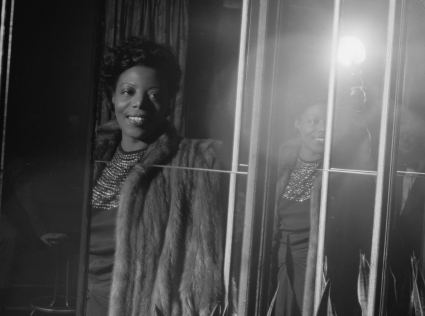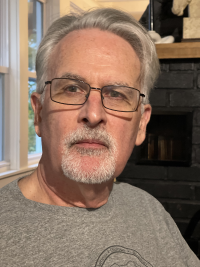.
.
photo by William Gottlieb/Library of Congress

Mary Lou Williams, c. 1938
.
.
___
.
.
Opus for Mary Lou
By John Bliss
.
…..“Baloney Bliss,” Mary Lou Williams said, lacing into my father.
…..Mary Lou was Black and brought a spiritual magic into my white world. Her nose was petite like an acorn without it’s cupule, and her straight shoulder length hair darker than her skin. She reminded me of prizefighters who would compact themselves. They get inside, wreak havoc, take a step back and shock their opponent with their reach. I missed the first round but Mary Lou had already worn my father down. She was on the inside and it was her fight. It was surprising to see how tall she was with her square, athletic shoulders. My family’s living room transformed into her arena.
…..“Why don’t they teach jazz in schools? You can’t play jazz in church, the most spiritual music there is, and Catholics ban it!” Her question cracked my frozen ignorance.
…..Mary Lou was determined to set a new course for her music. In 1903 Pope Benedict banned any instrument “that may give reasonable cause for disgust or scandal.” Jazz and the saxophone were targeted in particular because they induced salacious cravings in women. Mary Lou once said, “I only fell in love with horns. Ben Webster was the exception and that lasted about a month.” Years later I started to play the tenor saxophone. Ben Webster is one of my heroes.
…..She continued to spar with my father.
…..“Do you teach your kids about jazz? Do they know who John Coltrane is?” She pointed her index finger at my father. Her reddish pink fingernail glowed like the tip of a wooden matchstick.
…..My father just stood there. I was so happy I didn’t miss this.
…..“Do your kids even know his name?”
…..Mary Lou was in her fifties when we met. I was 13. The Greeks define seven types of love. I didn’t know which one or where I was falling but it felt wonderful. Barely an adolescent, I was already aware that I was the “delinquent” in the room. My parents, brothers and sister had the virtuous roles sewn up: professionals, artists, athletes and geniuses. The handle on me was I didn’t test well, was unmotivated, and at times just plain stupid. I desperately wanted to have value.
…..My father asked me, “Johnny do you know who John Coltrane is?”
…..“Elvin Jones was his drummer.” I had just read an interview with Jones in Rolling Stone magazine. What timing? It was the first time I had heard of John Coltrane or Elvin Jones.
…..Mary Lou’s eyebrows rose nearly an inch and I was caught in the snare of her brown eyes. I am still holding on to her slight nod and wink. “Well I guess there may be some hope for you all after all, the kids always teaching us.”
…..She exposed her ivory teeth and looked at me. I felt like I’d hit the Irish Sweepstakes. Mary Lou and I shared this moment.
…..That rage that she so fervently delivered with class was the greatest thing I had ever seen. We couldn’t have been more different but I recognized the angst in her. For a moment I was center stage with her. The experience etched into my psyche’s hall of fame.
…..We went as a family to hear Mary Lou play. When my brothers and I were older we’d go by ourselves, and sometimes after her gigs we’d go to her home at 63 Hamilton Terrace in Harlem. Musical history dripped off the walls of her apartment and I drank in every drop. I’d lean back on the couch that Bud Powell, Charlie Parker, Thelonious Monk, Dizzy Gillespie and countless other great musicians sat on, with Mary Lou sometimes playing and singing. “My sister Grace drinks all the time, spends all her money, comes to take mine,” then she’d laugh. I wanted to stay there forever.
…..In the early 1970’s my brothers traveled to the Monterey Jazz Festival with her by train. I didn’t want to be trapped in a ring of sibling rivalry over Mary Lou’s attention. I stayed home. I wanted Mary Lou to myself. But a few years later she had a residency at a jazz club in Greenwich Village called The Cookery. I’d often stop in to listen to her gifts.
…..She’d tell me to go and sit with Jo Jones or Dizzy Gillespie. “Mary Lou sent me.” That was all I had to say and I was somebody.
…..I went to hear her alone one night and Mary Lou sat next to me. Barney Josephson, who owned The Cookery, and Mary Lou were having a terrible argument. Mary Lou said she hated getting so angry, “I could pull all these drapes down.” She tried to smile when I answered with, “Let me know when you want to get started.” Even though our journeys were so different, we shared sadness and anger. She wrote “Blues For John” decades before I was born. I still enjoy thinking it was for me. Love has a credibility all its own.
…..I’d developed a daily drug habit without a clue as to how I’d break free from it. Her gigs were a bubble I could crawl into. One evening I wandered into the club, and when Mary Lou finished her last tune I wanted to cry. She sat down next to me and I looked at her.
…..“Jesus, Mary, you make me want to love.”
…..“That’s what it’s supposed to do.” She tapped the back of my hand. In hindsight what I really meant was that I loved her.
…..Years later, I began to appreciate the impact Mary Lou had on me. I was terrified I would never amount to anything. She had perfect pitch and there is a transcendence that can happen when someone like her listens to you.
…..I last saw her in 1979; I had been clean for three years and was in college. I was proud of myself and she was happy to see me.
…..When I got married in 1980, I invited her to my wedding. She wrote a note explaining that she wasn’t well and wished me much happiness and love, and she knew I would do something meaningful with my life.
…..After she died in 1981, I found myself wanting to know everything about her. I learned she’d become discouraged about music and started a thrift shop to assist musicians who were struggling with mental illness and addiction. Her pilgrimage led her to a kind of social work. I became a social worker in 1983 and a few years later opened an outpatient drug rehab.
.
……Mary Lou converted to Catholicism in 1954.
…..“It was the only church in my neighborhood that left its doors open during the day. Two priests, Father Crowley and Father Woods, convinced me the way to save people and myself was through my music.”
…..“Just like that?” I’d asked her. “I always imagined a calling would be something like a bird on your windowsill that said follow me or a banshee-type figure with instructions on how to save your soul. I’ve never felt that passionate about anything.”
…..“Keep your heart open and you will,” she said.
…..“Music is the way I reach people,” she used to say.
…..During the 1960’s and 70’s Mary Lou wrote a series of spiritual scores that developed into “Mary Lou’s Mass,” which debuted at the Interfaith Church Center in upper Manhattan.
…..It was a Sunday in springtime. Mabel Mercer would do the first reading. Mary Lou told Peter O’Brien to have me come to the vestibule as soon as I arrived. As I walked into the room, Mary Lou said, “When Mabel finishes, John, you wait a minute, then come up to the pulpit. You’re reading the psalm 1 Corinthians 13:11. Here, take a look at it!”
…..I felt really special to be chosen to do this, but was scared I’d mess it up so I immediately tried to weasel my way out of it.
…..“Mary, I have laryngitis, I mean strep, yeah strep. Can’t you hear it? It’s contagious. I’ll contaminate the entire congregation!” I used a hoarse whisper.
…..Mary Lou, chuckling now, said “ You’ll be fine.”
…..“Don’t you think you should ask one of my brothers? How are they going to feel? Stephen is the oldest. He should read it! Matthew is a much better Catholic than me! There have to be a few hundred people out there.”
…..Mary Lou knew I wanted her to pick me; she spoke to the part in me that wanted to do things and nudged me with the perfect amount of pressure. I went into the nave and sat down in the front. When I heard Mary’s music, I felt bulletproof.
…..Mabel finished. I walked up to the pulpit., where a massive Bible sat waiting for me, a long, thick purple ribbon attached to the binding and a gold tab at the end. I moved it to the right and there it was; 1 Corinthian’s 13:11.
…..As I spoke, my voice bellowed like a man’s voice.
…..“Though I speak with the tongues of men and of angels, and not have charity, I am become as sounding brass, or a tinkling cymbal…When I was a child, I spoke as a child, I understood as a child, I thought as a child: but when I became a man, I put away childish things…”
…..It makes me happy thinking of playing Mary Lou’s “Blues for John”, with her up in heaven. Imagine the band we could put together.
.
.
___
.
.

John Bliss is a psychoanalyst and clinical social worker who co-founded an outpatient licensed substance abuse clinic thirty years ago, where he continues to work. He has focused on writing about personal experiences at the encouragement of his wife Leslie, daughters Jenna and Jillian, patients, musician friends, and now his writing buddies. Map Literary published his story “Keep The Change” in the fall of 2017, and his story “Dares” appeared in the November, 2017 issue of Adelaide Literary Magazine. He has also published three other stories. The process of developing narratives in his therapy practice, playing saxophone, and writing is exhilarating to him. Writing has a special appeal, he can do it anytime and it doesn’t wake up the neighbors the way the horn does. John lives with his wife in New York City.
.
.
Listen to a 1978 recording of Mary Lou Williams playing “Blues For John.”
.
.
Click here for information on how to submit your work
.
.
.

































Mary Lou was a close friend of ‘Nica ‘the jazz baroness’ .In the latter’s photo-book ‘5 wishes’ Mary was among the enlightened few whose recorded ‘wishes’ were for a universal peace and spiritual well-being.
I was fortunate to know Nica’s niece Sarah whose temperament was similar.